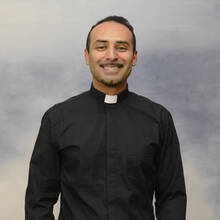In Scripture, God’s mercy gravitates toward the outlier
A covenant that becomes open to more and more people over time is a theme that runs through parts of Scripture. This theme lies in tension with a desire to see in the covenant a sign of one’s privileged status.
Please, Lord, for even the dogs eat the scraps that fall from the table of their masters. (Mt 15:27)
Pope Francis invites todos, everyone, to the church; what feelings does this inspire in you?
When was the last time you had as heated an exchange with God as the Canaanite woman did?
Do you appeal to God’s mercy for healing in your own life?
Todos, todos, todos! “Everyone, everyone, everyone!” That was Pope Francis’s message to the young participants who attended World Youth Day in Lisbon. Francis suggests that “everyone” has a place in the church. All are welcome. As with any universal claim, there comes a certain push back from those who feel left out of this todos. One priest-biblical scholar from Rwanda mused to himself on social media, “Todos? Where is Africa’s representation at WYD? Why are we not hosting WYD on the African continent?” While the hope for radical inclusion remains palpable from Pope Francis’s remarks, the pain of actual exclusion remains.
This Sunday’s readings highlight the tension between inclusivity and exclusivity, but the readings also trend in one hopeful direction upon closer inspection. This tension is already apparent in the Hebrew Bible. In this Sunday’s first reading, Isaiah reflects on the role of foreigners in Israelite worship. He comes to the conclusion that they are welcome: “All who keep the sabbath free from profanation and hold to my covenant, them I will bring to my holy mountain and make joyful in my house of prayer” (Is 56:6-7). Even more radically, Isaiah imagines these foreigners will now be drawn more deeply into the worship of the temple (Is 56:6). While a strict covenantal system of worship can be exclusive, Israelite thought about the place of foreigners developed over time. One should always distinguish between the lived-reality and the rhetoric used in Scripture. Isaiah recognizes a place for foreigners in Israel’s worship, even as he reflects on his own privileged status under the covenant. He recognizes, however, that the covenant and his place in it depend solely on his relationship with God and not on something predetermined by birth or merit.
For some, Pope Francis’s desire that the church be open to todos, everyone, seems naïve. Today’s readings suggest the opposite, that God desires a covenant that includes todos.
Paul, too, recognizes the privileged status of his own Jewish heritage, “For the gifts and the call of God are irrevocable” (Rm 11:29). He concedes to God’s mercy, however, and such mercy is open to everyone, to Pope Francis’s todos. “For God delivered all to disobedience,” writes Paul, “that he might have mercy upon all” (Rm 11:32). These passages suggest an emphasis on a covenant of relationship; anyone can enter into this covenant if they are willing to live in relationship. The Canaanite woman from today’s Gospel, for example, wants this relationship and appeals to the source of God’s mercy.
The episode in this Sunday’s Gospel finds Jesus in a difficult situation. Many believed that the Messiah would come to restore the house of Israel, which would itself then be a light to foreign nations. Jesus used this expectation as a teachable moment. The Canaanite foreigner did not let a narrow covenantal theology impede her request. Her daughter was sick, tormented by a demon. It seems that the pain was too much for the mother and daughter. She was relentless in her appeal to divine compassion, “Have mercy on me, Lord, Son of David,” and again later in the passage, “Lord, help me” (Mt 15:22-25).
A game of wit between the foreigner and Jesus plays out within the passage. Jesus says he is sent “only” to the lost sheep of the house of Israel (Mt 15:24). But she knows this already: she greets Jesus with an Israelite royal title, “Lord, Son of David.” Apparently, she does know some covenantal theology. Jesus pushes his rebuttal further by using table humor, stating that the food of God’s children should not be thrown to the dogs. With no hesitation, she quips back, “Lord, even the dogs eat the scraps that fall” (Mt 15:27). She wins. “O woman, great is your faith!” says Jesus (Mt 15:28).
For some, Pope Francis’s desire that the church be open to todos, everyone, seems naïve. Today’s readings suggest the opposite, that God desires a covenant that includes todos. “For my house,” writes Isaiah, “shall be called a house of prayer for all peoples” (Is 56:7).








